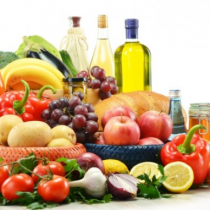
WWF launched “Planet-Based Diets,” a new approach to choosing foods that can help ensure a healthy planet and people. The initiative will offer not only a global framework, but also, for the first time, a personalized platform that can accelerate the adoption of healthy and sustainable diets based on the planet, nationally and individually.
The new report “Reversing the Curve: The Restorative Power of Planet-Based Diets” will help individuals and legislators understand the impact of their diets on health and the environment. The Planet-Based Diet Impact and Action Calculator can help lay the groundwork for better decision-making by measuring the national impacts of any diet on health and the environment. It is customized in 13 food groups and based on datasets and analysis adapted for 147 countries. L
The Calculator will help policymakers design more ambitious National Food Guides (NDGs) and incorporate dietary transition into other policy frameworks, in line with global environmental, climate, and health goals.
The report “Reversing the Curve: The Restorative Power of Planet-Based Diets” suggests that the transition to planet-based diets offers great benefits for human health and low environmental impacts, including a more stable climate, less wildlife loss, and more space for it to thrive and, fundamentally, longer, healthier lives for people.
“Dietary changes take place at the local level, so it was important for us to translate the global agenda into a nationwide actionable analysis,” said Brent Loken, a global WWF science leader and lead author of the report. “There is no one-of-a-all solution. For example, in some countries there must be a significant reduction in the consumption of food of animal origin, while in others an increase may be needed to cope with the burden of malnutrition. Health and the environment should be considered together. Our Impact and Action Calculator will help countries better understand the impacts of dietary changes, so they can provide all their citizens with diets that are good for both people and the planet.”
Climate crisis
As recognized at the recent UN Biodiversity Summit, the climate crisis and the destruction of nature, both significantly driven by the food system, leave humanity in a state of planetary emergency. In the context of the ongoing pandemic, it is more important than ever to adopt healthier and more considerate diets.
The main drivers of emerging infectious diseases, such as Covid-19, have been shown to be the unsustainable conversion of land for agriculture, intensive livestock and illegal wildlife trade (often for consumption). That’s why it’s necessary to change the way we produce and consume food to give everyone a healthy and sustainable future.
“What we eat indisputably has an impact on our health and the planet. And for the latter, we must change course now to ensure nutritious and sustainable diets for future generations. This new WWF report contributes to the debate with new knowledge and tools that can inspire and potentially drive both policies and consumers towards more sustainable and healthy diets. It’s necessary. Globally and locally,” said Mogens Jensen, Danish Minister of Food, Fisheries and Equal Opportunities.
“In Denmark, we are launching a new set of Danish dietary guidelines based on food and, for the first time, combining knowledge of what is good for human health and climate. This thinking is in line with the ongoing work of developing new Nordic Nutritional Recommendations in 2022. I hope that many countries and regions are doing the same work. We need to address global challenges using the transformative power of food,” he added.
At the national level, Mariann Breu, Coordinator of Markets and Ecological Footprint at WWF Chile, invited the use of the Planet-Based Diets tool and stressed that “the current pandemic has shown us the importance of maintaining a healthy planet to also ensure the health of theso the challenge is to move forward on those two lines, a goal to which this platform contributes. The Planet-Based Diets model shows that it is possible to achieve both through many different feeding patterns. It is imperative that everyone in Chile and the world can have access to healthy, nutritious and sustainable food.”
In addition to the Impact and Action Calculator and Report, the planet-based diet platform will provide open data for 147 countries on the diet-related impacts of eight human and environmental health indicators, as well as policy recommendations and a collection of deep dives into five strategic actions needed to move from a global food system that exploits the planet to one that restores it to people and nature.
Food systems and biodiversity losses
“Not changing our diets is having a dramatic impact on our health, nature, climate and other aspects of socioeconomic development,” said Joao Campari, world leader in WWF’s food practice. “Food systems are the main driver of biodiversity loss. Over the past 50 years, species populations have declined by an average of 68% and food production has caused 70% of biodiversity loss on the mainland and 50% in freshwater. If we want to achieve food systems that protect nature, while providing everyone with enough nutritious and healthy food, we need an unprecedented level of collaboration to achieve urgent transitions to planet-based diets.”
With next year’s UN Food Systems Summit, with the aim of catalyzing bold new actions and advancing the Sustainable Development Goals, WWF is calling for the redesign of the National Dietary Guidelines (NDG) to equate healthy eating with sustainable food, and the implementation of ambitious national food plans. Prior to the annual summits of the United Nations Framework to Combat Climate Change and the United Nations Convention on Biological Diversity in 2021, the Planet-Based Diet Platform recommends that dietary changes be integrated into Nationally Determined Contributions (NDCs) and the Global Biodiversity Framework.
“We have only nine years left and the last nine crops to transform our food system and meet the Sustainable Development Goals by 2030 or deal with potentially irreversible damage to nature and people,” Campari said. “We need actions throughout the food system, in production, consumption and food loss and waste. Adopting planet-based diets, which will increase conscious consumption and change market demands, can accelerate other actions and help achieve sustained change.”





